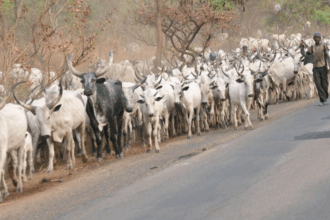Mr Festus Okoye, INEC National Electoral Commissioner for Information and Voter Education, has denied rigging the last weekend by-election for the Ogoja-Yala federal constituency in Cross River State in favor of the ruling APC.
Few days ago, the state chairman of the opposition PDP, Venatius Ikem, addressed a news conference in Calabar, accusing Mr Okoye, who oversaw the two by-elections on February 26, 2022, of compromising his office and rigging the exercise for the APC.
ATTENTION: Click “HERE” to join our WhatsApp group and receive News updates directly on your WhatsApp!
“Nothing could be further from the truth,” Okoye said on Sparkling FM, a private radio station in Calabar.
He took the time to explain the election processes, demonstrating how difficult it would be to rig an election using the Biomodal Voter Accreditation System (BVAS) machine used for the exercise.
He stated that one of the challenges the INEC faced during the 2022 by-elections was the provision of agents and vehicles by other political parties to accompany the electoral materials to the various polling units.
He explained that the anxiety and anger that arose as a result of the by-elections stemmed from people who wanted to rig the process but were unable to do so.
The problem was that some political parties did not provide vehicles to transport voting materials to polling places.
So, at each stage, the two major political parties had representatives at the PU.
Because of BVAS, those who used to hawk voting materials such as permanent voters’ cards did not have the opportunity to corrupt the system this time.
Accredited voters’ faces and fingerprints were read by BVAS. If the machine was unable to do so, it means that the person was involved in identity theft, which means that he was not registered at that PU and the voter card he was holding was invalid.
“That’s why you saw such a high level of competition and consistency in the number of votes received by each party.” Consider what used to happen when we used Incident Form. “So it tells you that those who voted at each PU were those who were registered there,” he explained.
Okoye went on to say that before the votes were counted, they had to query the BVAS, which provided them with the number of registered and accredited voters at the given PU.
This, he explained, was to ensure that the votes cast corresponded to the number of registered voters.

